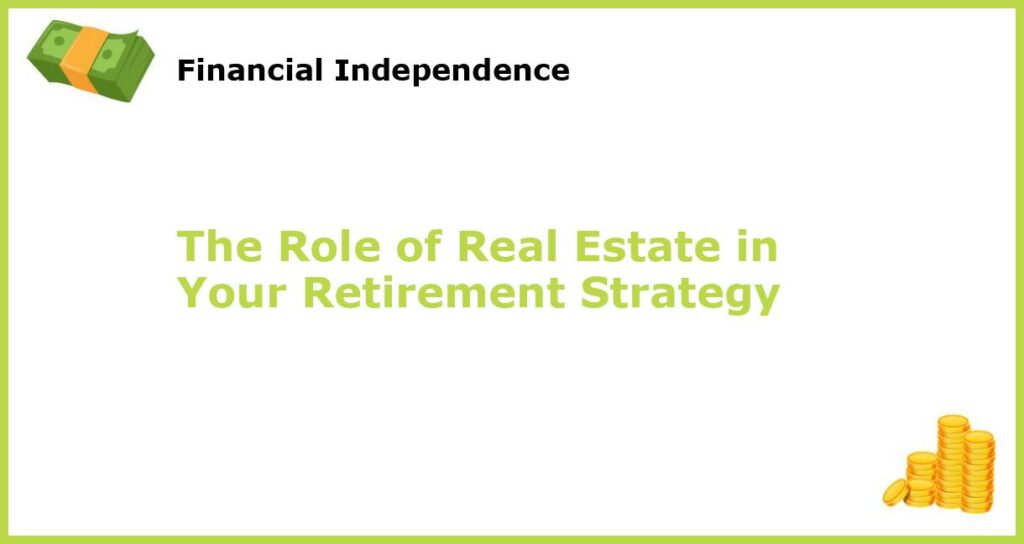Retirement planning can be a daunting task, and many investment options can seem overwhelming. However, one investment opportunity that should not be overlooked is real estate. Real estate can serve as an excellent addition to your retirement strategy and can provide a range of benefits. Here are ten reasons why real estate can play an important role in your retirement planning:
1. Investment Opportunities

Real estate can serve as a great investment opportunity for those who are planning for retirement. Investing in property can provide steady cash flow through rental income, and if managed well, can appreciate in value over time. Additionally, owning property can provide tax benefits and diversify your investment portfolio.
Investment property can provide cash flow through rental income. You can purchase a property and collect monthly rent payments from tenants. This steady income stream can provide financial stability during your retirement. In addition to rental income, real estate can also appreciate in value over time which can grow your equity in the property. Additionally, owning real estate can provide tax benefits, especially if you plan to use the property as a rental. This can help you minimize your taxes over time.
2. Rental Income Potential

If you plan to retire with an income stream, owning rental property can offer consistent cash flow. Rent payments can provide a steady income source that can be used to supplement retirement income or provide an alternative to selling assets. However, it is important to understand the associated costs of owning and maintaining rental property.
Rental income can provide a financial cushion during your retirement. Owning rental property means that you will receive ongoing income from tenants. This income stream can be used to supplement other retirement income or pay off debt. Rental income can also provide a way to hang onto assets without having to sell them. Selling assets can provide a quick cash infusion, but you may have to sell at less-than-ideal terms.
3. Property Value Appreciation

Real estate is known to appreciate in value over time. This means that if you invest in property early in your career and hold onto it, it could appreciate significantly by the time you retire. This appreciation could significantly increase your net worth and give you a comfortable retirement.
Property appreciation can provide a significant boost to your net worth. Over time, property values tend to increase. This means that if you purchase a property early in your career, it may be worth significantly more by the time you retire. This equity can provide financial comfort in your later years and can help to supplement your retirement income.
4. Hedge Against Inflation

Another benefit of owning real estate is that it can serve as a hedge against inflation. As the cost of goods and services go up, so do rents and property values. Real estate investors can potentially benefit from this by seeing an increase in their rental income and property value as the result of inflation.
Real estate can provide a hedge against inflation. As prices rise, so do the prices of rent and property values. This means that rental income can keep up with the rising cost of living. Additionally, property values may increase significantly over time which can help to keep pace with inflation. This can help to maintain your lifestyle during retirement despite an increase in the cost of living.
5. Loan Repayment with Equity

Real estate investors can use equity in their property to pay off loans. As the property value increases over time, so does the equity in the property. Investors can use this equity to pay off loans and potentially own the property outright. This can be a great strategy for investors who want to pay down debt before retirement.
Equity in property can be used to pay off other debts. As the value of the property increases over time, so does the equity in the property. This equity can be used to pay off other debts such as a mortgage or other loans. By paying off debt, you can reduce your expenses during retirement and increase your financial security.
6. Downsize for Retirement

For those who do not want to manage property in retirement or want to use their equity to supplement retirement income, downsizing can be a great option. Selling a larger property and downsizing to a smaller one can provide a cash infusion that can be used to supplement retirement income or pay off debt.
Downsizing can provide a financial boost during retirement. If you don’t want the hassle of managing property during retirement or if you want to use your equity to supplement retirement income, downsizing can be a great option. Selling a larger property and downsizing to a smaller one can provide you with cash that can be used to boost your retirement income or pay off debt. This can provide financial peace of mind during your later years.
7. Location Matters
The location of your property is crucial when planning for retirement. Real estate markets can vary greatly across the country, so it is important to understand how to invest in properties in areas that are likely to see appreciation in value over time. Additionally, owning property in a location that is desirable to retirees can help you sell your property for more when the time comes.
Location is an important consideration when purchasing a property for retirement. Certain areas are more likely to see appreciation in property values than others. This can be due to a variety of factors such as population growth or the development of the local economy. Additionally, owning property in a desirable location can help you sell your property for a higher price when you are ready to retire.
8. Alternative to Traditional Investments
Real estate can serve as an alternative investment to traditional options such as stocks and bonds. While the risks associated with owning property are different than those of traditional investments, it can provide an opportunity for diversification and balance in your investment portfolio.
Real estate can provide diversification in your investment portfolio. Traditional investments such as stocks and bonds are important, but they can be risky. By investing in a rental property, you can diversify your portfolio and spread your risk. This diversification can help to provide balance and reduce your overall risk. Additionally, rental income can provide a stable income stream that can balance out the potential volatility of traditional investments.
9. Cash Flow Management
Managing cash flow in retirement can be challenging. Owning property can provide a stream of rental income that can be used to supplement any other income sources or cover unexpected expenses. This cash flow can provide peace of mind and financial stability in retirement.
Rental income from property can provide peace of mind during retirement. Cash flow management during retirement can be tricky, especially if you are living on a fixed income. Owning a rental property can provide a stream of rental income that you can use to supplement your retirement income or cover unexpected expenses. This can provide financial stability and help to minimize worry during retirement.
10. Potential for Retirement Income
If you are able to successfully invest in property, the potential for rental income can be a significant source of retirement income. This income can supplement any other retirement income you may have and provide a comfortable lifestyle. However, it is important to consider the associated costs and risks of owning property before investing.
Investing in real estate can provide a significant source of retirement income. If you are able to successfully invest in property and generate rental income, this income can supplement other retirement income sources and provide a comfortable lifestyle. However, it is important to understand the costs and risks of owning property before investing. This can help to ensure that you make the right decisions and maximize your return on your investment.







